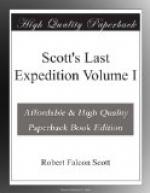Simpson evolved a new blizzard theory on this. He supposes the surface air intensely cooled over the continental and Barrier areas, and the edge of this cold region lapped by warmer air from the southern limits of Lockyer’s cyclones. This would produce a condition of unstable equilibrium, with great potentiality for movement. Since, as we have found, volumes of cold air at different temperatures are very loath to mix, the condition could not be relieved by any gradual process, but continues until the stream is released by some minor cause, when, the ball once started, a huge disturbance results. It seems to be generally held that warm air is passing polewards from the equator continuously at the high levels. It is this potentially warm air which, mixed by the disturbance with the cold air of the interior, gives to our winds so high a temperature.
Such is this theory—like its predecessor it is put up for cockshies, and doubtless by our balloon work or by some other observations it will be upset or modified. Meanwhile it is well to keep one’s mind alive with such problems, which mark the road of advance.
Sunday, August 6.—Sunday with its usual routine. Hymn singing has become a point on which we begin to take some pride to ourselves. With our full attendance of singers we now get a grand volume of sound.
The day started overcast. Chalky is an excellent adjective to describe the appearance of our outlook when the light is much diffused and shadows poor; the scene is dull and flat.
In the afternoon the sky cleared, the moon over Erebus gave a straw colour to the dissipating clouds. This evening the air is full of ice crystals and a stratus forms again. This alternation of clouded and clear skies has been the routine for some time now and is accompanied by the absence of wind which is delightfully novel.
The blood of the Crozier Party, tested by Atkinson, shows a very slight increase of acidity—such was to be expected, and it is pleasing to note that there is no sign of scurvy. If the preserved foods had tended to promote the disease, the length of time and severity of conditions would certainly have brought it out. I think we should be safe on the long journey.
I have had several little chats with Wilson on the happenings of the journey. He says there is no doubt Cherry-Garrard felt the conditions most severely, though he was not only without complaint, but continuously anxious to help others.
Apropos, we both conclude that it is the younger people that have the worst time; Gran, our youngest member (23), is a very clear example, and now Cherry-Garrard at 26.
Wilson (39) says he never felt cold less than he does now; I suppose that between 30 and 40 is the best all round age. Bowers is a wonder of course. He is 29. When past the forties it is encouraging to remember that Peary was 52!!
Thursday, August 10.—There has been very little to record of late and my pen has been busy on past records.




